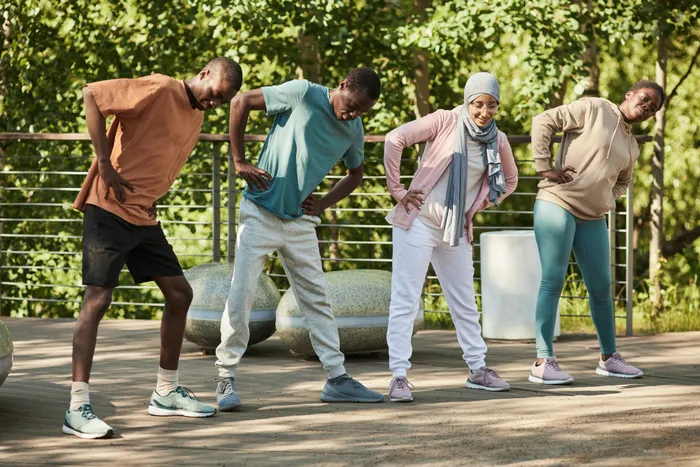End the worry of osteoporosis: exercises backed by science for strong bone health for women

The positive effects of exercise on ageing include improved cardiovascular health, increased muscle strength and flexibility. Picture: Unsplash Edmond Dantès
As the saying goes, “Age is just a number”. And science is increasingly proving that exercise plays a pivotal role in defying the limitations often associated with growing older.
As we age, maintaining an active lifestyle becomes increasingly important for preserving our overall health and well-being.
Regular exercise has gained substantial recognition for its profound benefits, not only in terms of longevity, but also in preventing various age-related illnesses.
Moreover, for women, exercise plays a vital role in reducing their risk of osteoporosis. In honour of Women’s Month, we delve into the reasons why exercise is praised for ageing and explore the most effective exercises for women to prevent osteoporosis.
Osteoporosis, a condition characterised by weakened bones, chiefly affects women during and after menopause.
Today, half of all women older than 50, and up to one in four men, will break a bone because of osteoporosis, says Harvard Medical School. You don’t have to be one of them!
Physical activity plays an important role in healthy ageing, benefiting both the body and mind.
It’s important to note that physical exercise is not always easy for women due to family responsibilities, body image issues and especially safety concerns.
However, a myriad studies have highlighted the positive effects of exercise on ageing, including improved cardiovascular health, increased muscle strength and flexibility, enhanced cognitive function, and reduced risk of chronic diseases.
According to the World Health Organization, people who are not active have a 20% to 30% increased risk of death compared with people who are sufficiently active.
In South Africa, obesity is a rapidly growing concern as nearly 70% of women and 31% of men are classified as overweight or obese.
These numbers point to an epidemic, considering that there are more than 229 medical conditions that are directly linked to being overweight or obese.
Furthermore, mechanical issues, such as back pain and knee pain, are more common in older adults, affecting more than half of those over 60 years old.
The benefits of exercise for healthy ageing:
Improved physical health
Engaging in regular exercise helps maintain cardiovascular health, strengthens muscles and bones, and improves flexibility and balance. These factors reduce the risk of chronic conditions such as heart disease, diabetes, and arthritis.

Enhanced cognitive function
Studies have shown that physical activity can improve cognitive function, memory, and attention span. Exercise stimulates the release of chemicals in the brain that promote neural growth and protect against age-related cognitive decline.
Mental well-being
Exercise has a profound impact on mental health, reducing symptoms of anxiety and depression. It boosts mood by stimulating the release of endorphins, the brain's natural feel-good chemicals.
Research consistently demonstrates that regular exercise is associated with a longer lifespan. Engaging in physical activity helps prevent premature death by reducing the risk of chronic diseases and maintaining overall health.
Exercises recommended for women to reduce the onset of osteoporosis
Weight-bearing exercises
These activities involve supporting your body weight against gravity and stimulating bone growth and strength. Examples include walking, jogging, dancing, and hiking.
Strength training
Resistance exercises, such as lifting weights or using resistance bands, increase muscle strength and bone density. Focus on exercises that target the major muscle groups, such as squats, lunges, and push-ups.
Balance and posture
These activities improve stability and reduce the risk of falls, which can be particularly dangerous for individuals with osteoporosis. Yoga, tai chi, and Pilates are excellent choices for improving balance and posture.
Low-impact aerobic exercises
For individuals with joint issues or limited mobility, low-impact exercises provide an excellent alternative. Swimming, cycling, and using an elliptical machine are gentle on the joints while still promoting cardiovascular health and overall fitness.
More research further highlights the positive impact of exercise on ageing and disease prevention.
A study published in the “British Journal of Sports Medicine” found that older adults who engaged in regular exercise had a significantly reduced risk of developing chronic diseases, such as heart disease, stroke, and diabetes.
A 10-year study conducted by the University of California, San Francisco, revealed that women who engaged in high levels of physical activity had a 30% lower risk of hip fractures compared with those who were sedentary.
Exercise is a powerful tool in promoting healthy ageing, preventing sickness, and maintaining overall wellness.
By incorporating weight-bearing exercises, strength training, balance and posture exercises, and low-impact aerobic activities into their routines, women can significantly reduce the risk of osteoporosis and enjoy a healthier, more vibrant life as they age.
Related Topics: